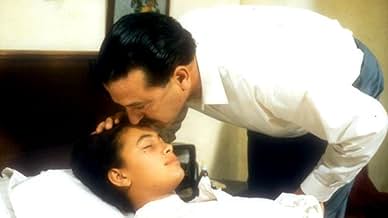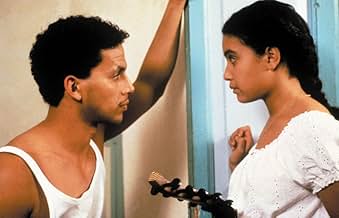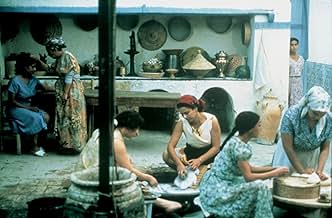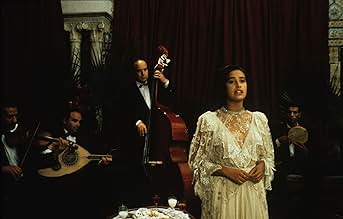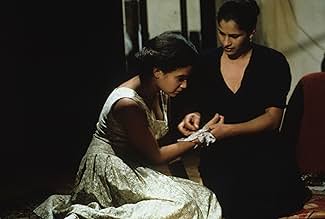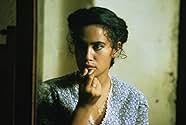IMDb RATING
7.4/10
1.2K
YOUR RATING
As she grows up, Alia (the daughter of housemaid Khedija) learns the secrets of the peaceful palace where she and her mother live.As she grows up, Alia (the daughter of housemaid Khedija) learns the secrets of the peaceful palace where she and her mother live.As she grows up, Alia (the daughter of housemaid Khedija) learns the secrets of the peaceful palace where she and her mother live.
- Awards
- 7 wins total
Hind Sabri
- Alia
- (as Hend Sabri)
- …
Ghalya Lacroix
- Alia
- (as Ghalia Lacroix)
- …
Nejia Ouerghi
- Khalti Hadda
- (as Najia Ouerghi)
- Director
- Writers
- All cast & crew
- Production, box office & more at IMDbPro
Storyline
Did you know
- ConnectionsFeatured in Women Make Film: A New Road Movie Through Cinema (2018)
Featured review
Assimilated into the Turkish Ottoman Empire in the 16th century, Tunisia became a French protectorate in 1881 until President Habib Bourguiba, leader of a two-year guerrilla war for independence, declared Tunisia a republic in 1957, ending the rule of the former Ottoman Beys. Winner of the Cannes Jury Prize in 1994, Tunisian director Moufid Tlatli's Silences of the Palace depicts the oppressive nature of the male-dominated palaces and the price that women servants had to pay. Required not only to cook and clean, but to serve the sexual needs of the princes, Silences shows the consequences in the lives of two strong-minded but vulnerable women: Khedija (Amel Hedhili) and her young daughter Alia (Hend Sabri).
The film opens in the 1960s. Alia (Ghalia Lacroix), is now 25 and performing as a night club singer. Though she is nominally free, she is beholden to a man who refuses to marry or have children. When she learns of the death of Prince Sidi Ali (Kamel Fazaa) she returns to the palace in which she grew up to pay a condolence call to Ali's near-blind widow (Najia Ouerghi), a visit that opens the floodgates of memories. Told in flashbacks, the film shows Alia as a pre-adolescent becoming increasingly aware of her own body and sadly, of her mother's true role in the palace. Alia is a gifted singer and the musical numbers in the film are hauntingly beautiful but nothing can hide the torment the young girl faces in trying to find out who her father is and to sort out where she belongs. The performance of Ms. Sabri is wondrous as she conveys the confusion of coming of age in a non-nurturing environment while still maintaining her charm and enchanting us with her songs.
Tlatli, in her first feature film, never shoots outside of the palace interior, conveying the sense of oppression and isolation though the servants listen on the radio to news about the growing struggle for independence. The women are strong and resilient, however, in spite of what they must face each day. Though Khedija tries to protect her daughter from the same fate she suffers, she knows that her power is limited. "If a man touches you, run away,'' she tells her, "Your place is with me in the kitchen." When Alia suggests that they both leave together, her mother can only respond "Where would we go? This is the only home I've ever known." While Tlatli bravely challenges the institutions that led to male dominance, there is a tone of resignation and acceptance in the silences that suggests the subservient role many women play in Moslem countries to this day. Silences of the Palace is a lovely film but one that left me with a sense of aching loss.
The film opens in the 1960s. Alia (Ghalia Lacroix), is now 25 and performing as a night club singer. Though she is nominally free, she is beholden to a man who refuses to marry or have children. When she learns of the death of Prince Sidi Ali (Kamel Fazaa) she returns to the palace in which she grew up to pay a condolence call to Ali's near-blind widow (Najia Ouerghi), a visit that opens the floodgates of memories. Told in flashbacks, the film shows Alia as a pre-adolescent becoming increasingly aware of her own body and sadly, of her mother's true role in the palace. Alia is a gifted singer and the musical numbers in the film are hauntingly beautiful but nothing can hide the torment the young girl faces in trying to find out who her father is and to sort out where she belongs. The performance of Ms. Sabri is wondrous as she conveys the confusion of coming of age in a non-nurturing environment while still maintaining her charm and enchanting us with her songs.
Tlatli, in her first feature film, never shoots outside of the palace interior, conveying the sense of oppression and isolation though the servants listen on the radio to news about the growing struggle for independence. The women are strong and resilient, however, in spite of what they must face each day. Though Khedija tries to protect her daughter from the same fate she suffers, she knows that her power is limited. "If a man touches you, run away,'' she tells her, "Your place is with me in the kitchen." When Alia suggests that they both leave together, her mother can only respond "Where would we go? This is the only home I've ever known." While Tlatli bravely challenges the institutions that led to male dominance, there is a tone of resignation and acceptance in the silences that suggests the subservient role many women play in Moslem countries to this day. Silences of the Palace is a lovely film but one that left me with a sense of aching loss.
- howard.schumann
- Jun 4, 2006
- Permalink
- How long is The Silences of the Palace?Powered by Alexa
Details
- Release date
- Countries of origin
- Languages
- Also known as
- Sarayın Sessizliği
- Production companies
- See more company credits at IMDbPro
Contribute to this page
Suggest an edit or add missing content

Top Gap
By what name was The Silences of the Palace (1994) officially released in Canada in English?
Answer


